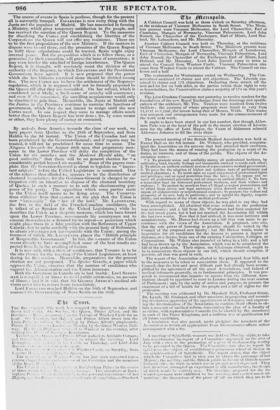The general meeting of the British Medical Association was held
at Exeter Hall on the 8th instant. Dr. Webster, who presided, congratu- lated the Association on the success that had attended their exertions. They had been the means of rousing the profession to a sense of its duties, its interests, and of those of the public. The objects of the As- sociation were-
" I. To promote union and cordiality among all professional brethren, by cultivating kind, friendly feelings and honourable conduct towards each other;
2. To obtain an uniform national system of representative medical government; 3. To press for the adoption of higher and uniform tests of preliminary and medical education; 4. lo insist upon an equal enjoyment of professional rights and privileges, and an equal protection from the laws ; 5. To oppose and re-
move all professional grievances, and all abuses in medical affairs; 6. To form a benevolent fund for distressed professional brethren, and their widows and
orphans; 7. To protect its members from all illegal or unjust prosecutions, and to afford them advice and legal assistance when deemed necessary ; 8. To oppose all dishonourable or unprofessional conduct ; to promote the welfare and prosperity of its own body in particular ; and to uphold the dignity, respect- ability, and usefulness of the whole medical profession."
With regard to many of these objects, he was glad to say they had been accomplished. All admitted that some reform in the profession was necessary ; and a bill from Mr. Warburton had been expected for the last seven years, hut it had not reached the Association till within the last two weeks. Now that it had arrived, it was most intricate and unsatisfactory. Mr. Hawes had drawn up a bill that was more in aca
cordance with the views of the Association. It proposed, inter cilia, that the sole power of licensing to practise should be vested in the
Council of the proposed new faculty : but Mr. Hawes wouki make it imperative for all candidates for the licence to possess a degree or diploma, or a licence from one of the existing Universities, Colleges, or Corporations. Mr. Wakley also intended to bring in a bill; and a bill had been drawn up by the Association, which was to be considered the bill of the profession. Their object, the Chairman observed, ought to be to concentrate these objects in one bill, which should comprise, if possible, all that was good in each.
The report of the Association alluded to the proposed four bills, amid to the measures to be taken:to concentrate them. It appeared to the Council, that the first and most difficult part had already been accom- plished by the agreement of all the great Associations, and indeed of medical reformers generally, as to fundamental principles. It was pro- posed to recommend that deputies or agents from the different Asso- ciations should be appointed to meet in London during the next session of' Parliament ; and, by the unity of action and purpose, to procure the enactment of a bill of health for tine people and a bill of rights for the profession.
The ineetinp; Ns-as addressed by Dr. Marshall Hall, Professor Grant, Dr. Lynch Mr. Grainger, and other members, in proposing and second- ing resolutions approving of the appointment of delegates, and express- ing the determination of the Association to continue their efforts to ob- tain a measure of' medical reform, recognizing the plan of a faculty of medicine, with representative Councils (to be elected by the members) in each of the Three Kingdoms, and a uniform test of qualification for all future candidates.
A resnintion was also passed, again pledging the members of the A s,ociatian to retern all applications from life-assurance-offices unless accompanied who a fee.


























 Previous page
Previous page